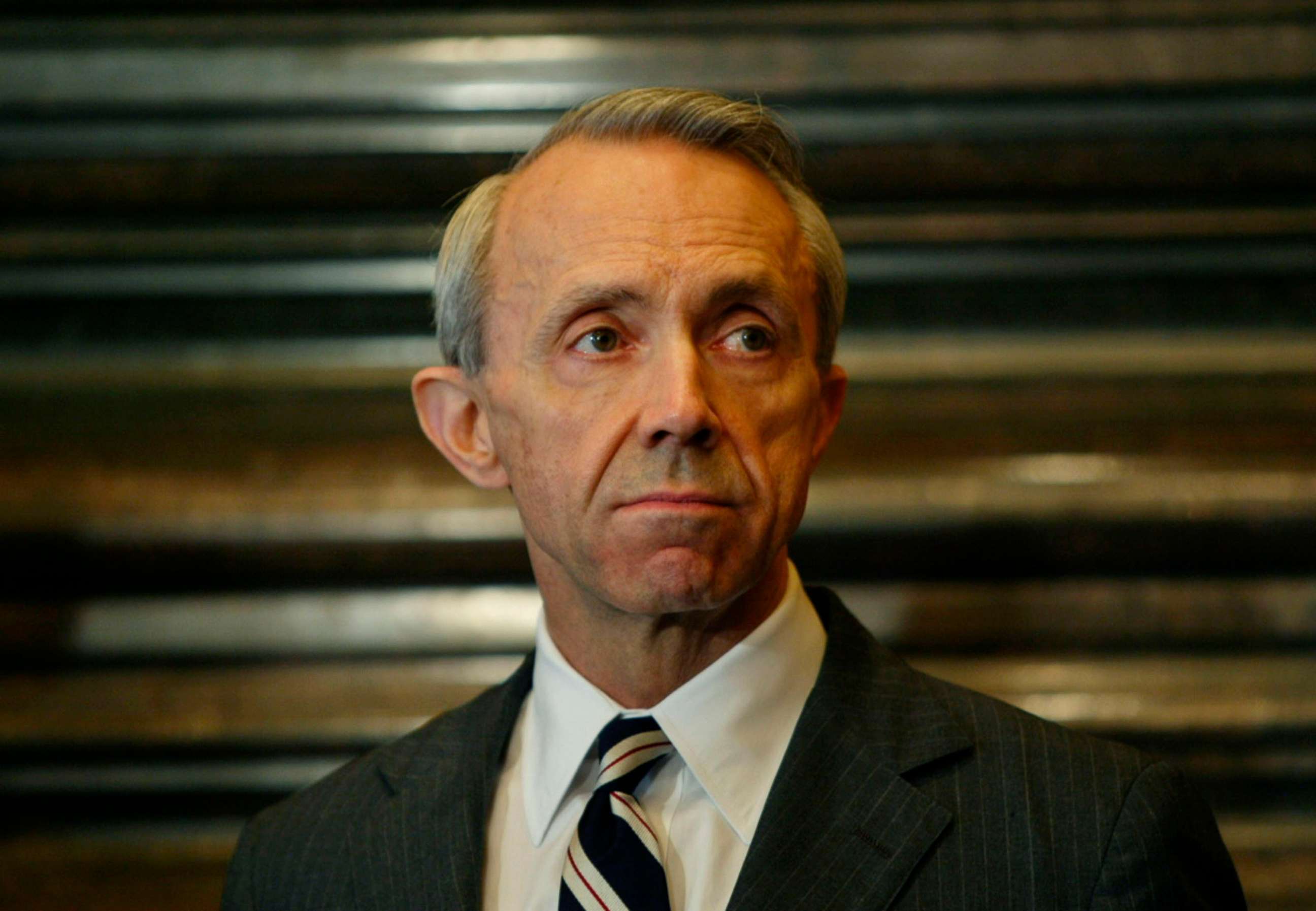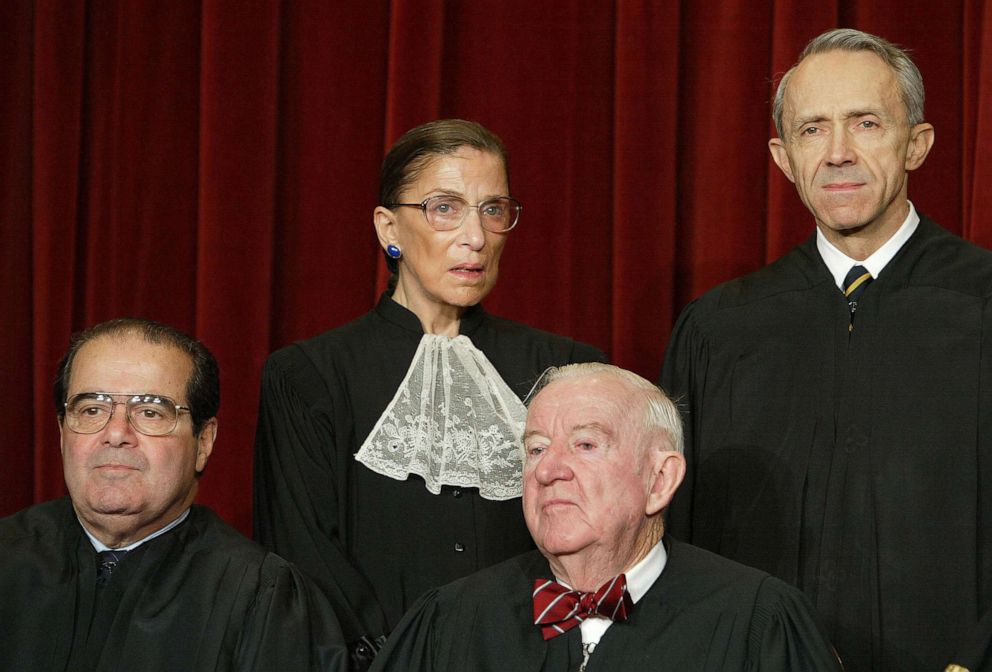Former Judge of the United States Supreme Court, David Souter, died at 85 years old

The former judge of the Supreme Court of the United States, David Souter, a life official, moderate judicial and defender of the teaching of the human and civic sciences, has died. He was 85 years old.
“Judge David Souter served our court with a big distinction for almost twenty years,” Chief Justice John Roberts said on Friday in a statement. “He brought a wisdom and kindness that is unusual to a public service life. After retiring to his beloved New Hampshire in 2009, he continued to render an important service to our branch by regularly sitting on the court of appeal for the first circuit for more than a decade. We will miss a lot.”
Survey was appointed in 1990 by President George HW Bush, who rented her Like “a remarkable judge of the lively intellect and the highest capacity”.

The associate judge of the Supreme Court of the United States, David H. SUVER, attended a press conference at the Supreme Court on May 28, 2003 in Washington, DC
Images David Hume Kennerly / Getty, file
In more than 19 years on the bench, he has written notable opinions on abortion, religion and property rights.
His moderate positions have surprised and disappointed many Republicans, who had hoped that SUVER would devote himself as a conservative the siege left in place by judge William Brennan, a long -standing chief of the Liberal wing of the Court.
Only five years after his appointment, the weekly conservative standard has qualified undergoing “stealth justice”, exciting his position as “one of the most strongest liberals in the court”.
For many conservatives, SUVER has become a symbol of what future Republican presidents should avoid in a candidate.
His most controversial opinion came in 1992, jointly written by judges Sandra Day O’Connor and Anthony Kennedy, reaffirming the right to abortion under ROE c. Wade and creating an “excessive burden” standard to judge state restrictions on the procedure.
“To cancel under fire, in the absence of the most imperious reason to re-examine a watershed decision, would overthrow the legitimacy of the court beyond any serious question,” wrote the three judges in Planned Parenthood v. Casey.
The defenders of SUBER have long denied that he was a secret liberal, emphasizing his respect for the previous one and the philosophy of “Originism”, which emphasizes the historical meaning of constitutional clauses and federal laws.
“The original meaning of conservatism was the reluctance to adopt a radical change,” said News Ernest Young, former clerk to undergo and Duke in law.
SUBER, which was an episcopalian, was also known to recommend strict government neutrality in matters of religion and constantly oppose religious exhibitions in public spaces.
During his confirmation hearing, he called for a “appalling fact” that Jewish children felt excluded when Christian prayers were recited in public schools.
In 2005, he was the author of a 5-4 decision blocking three Kentucky counties to show supervised copies of the ten commandments in the courthouses and public schools. He also voted against the authorization of prayers organized during the graduation ceremonies of secondary school and football matches.

The associate judge of the Supreme Court David H. SUBER poses for a photo at the Supreme Court of the United States on December 5, 2003 in Washington, DC.
Mark Wilson / Getty images
“He had no predisposed response. He really relied on an analysis of [historical] Materials to decide how he would go out in this case, “said Stuart Benjamin, former clerk of Souter and Duke Law Professor, in 2009.
SUBER was one of the four judges who were strongly dissident from the 2000 decision in Bush v. Gore, who ended the disputed voting story in Florida and actually presented the presidency to George W. Bush.
“Tearing it manually would be a high prescription, but before our court remains the effort to do so, Florida’s courts were ready to do their best to do this work,” wrote Underground. “There is no justification to refuse the state the opportunity to try to count all the voting ballots disputed now. I am respectfully dissipated.”
He would have been so upset by the decision he planned to resign from the court, said sources familiar with his thought to Jeffrey Toobin, author of “The Nine, within the secret world of the Supreme Court”. Some friends of justice firmly rejected the concept.
In 2005, SUVER joined the most liberal members of the Court to extend the capacity of local governments to seize private land for public use. His vote attracted fierce demonstrations and even prompted a voting measure to seize his farm in New Hampshire, 200 years old, as a recovery. He failed.
In testimony during his confirmation audiences, SUVER also surprised the conservatives with a solid defense of positive action.
“There will be a need – and I am afraid longer than we would like – a need for a positive action that seeks qualified people who have been discouraged by generations of societal discrimination to take their place in the dominant current of America,” he said at the time.
The rejection by underground of political ideology was celebrated among its former clerks and friends.
“He was a classic Yankee Frugal republican,” the former Harvard law professor, Rebecca Tashnet, told ABC News News in ABC News in 2009.
“The Republican Party has now moved considerably to the right,” said Pennsylvania University Professor News, the law professor at the University of Pennsylvania, who was a clerk in 1999 and 2000. “He does not look like a modern republican; he is not a modern person in many ways.”

Justice David Souter presents judge Ruth Ginsburg at lunch of the Radcliffe day where she received the Radcliffe medal.
Joanne Rathe / The Boston Globe via Getty Images
SUBER rarely spoke publicly about his jurisprudence, but when he did, he rejected sharply what he considered as a simplistic approach to the constitutional interpretation adopted by some of his peers named Republicans.
“Constitutional judgment is not a simple combination of fair reading and simple facts,” said SUBER in 2010 Departure address at Harvard University.
“The judges must choose between the good things that the Constitution approves, and when they do, they must choose, not on the basis of the measure, but of meaning,” he added, rejecting strict textualism approved by the judge of conservative icons Clarence Thomas and the deceased judge Antonin Scalia.
Withdrawing at just 69 years old, the ever married underground quickly escaped Washington to return to his new native Hampshire and his beloved two centuries.
For admirers, SUVER has brought a feeling of compassion for the high court.
“He urged all judges to recognize the human aspect of their decisions and to use all the power of their hearts and their minds and beings to obtain their correct decisions,” said Souresh, former president of Carnegie Mellon University, where SUVER spoke in October 2014.
Announcement of the retirement to undergo in 2009, President Barack Obama praised justice As a “fair and independent” judge who combined an “feverish work ethics” with a good sense of humor and integrity.
“He has always challenged the labels and rejected absolute, focusing on a single task – managing a fair result in the case before him,” said Obama, who then appointed Judge Sonia Sotomayor to fill his seat.

The associate judge of the Supreme Court of the United States, David H. SOURT, on the right, poses photos at the Supreme Court of the United States on December 5, 2003 in Washington, DC
Mark Wilson / Getty images, file
“He was really someone who considered himself someone working in Washington but not part of Washington,” one of the 1990 quarter clerks in 2009.
For years, he had disoriented the social scene of Washington when the court was not in session, withdrawing in the white mountain woods where he liked to hike and read by fire. SUBER did not have television or access to emails.
“Far from being disconnected from the modern world, he simply refused to surrender to the control of the aspects of his own life which give him a deep contentment,” said David McKean, former CEO of John F. Kennedy Presidential Library Foundation, at A joint appearance With retirement justice in 2010.
Born in the Massachusetts a only child, SUBER has spent most of his life in the rural city of Weare, New Hampshire. He enrolled at Harvard University as the first cycle, studying philosophy, then attended the University of Oxford as a Rhodes scholarship holder.
He returned to Boston to finish his law degree in Harvard, where he graduated in 1966. He quickly climbed the ranks of the legal world, reaching the Attorney General of New Hampshire and, later, judge associated with the Supreme Court of the State.
When SOURT was torn from New Hampshire by President George HW Bush in 1990, he was little known outside the state. The American Senate confirmed to the Supreme Court by a vote of 90-9.
“I loved my colleagues. I liked the work I was doing. There were days when I wanted things to go differently, but I have always loved the court and almost everyone in this building,” said in 2010, during a rare public appearance at the JFK presidential library. “But I feel free to do things that I couldn’t do in this court.”
For years after leaving the high court bench, SUBER continued to be a judge, hearing more than 300 cases by designation for the American court of appeal of the 1st circuit in Boston and by creating dozens of opinions.
While he was largely out of the spotlight, SUVER spoke passionate about the need to strengthen the education of the human and civic sciences across America.
“I do not believe that there is a problem in American policy or American public life which is more significant today than the omnipresent civic ignorance of the constitution of the United States and the structure of the government”, SUBER said in a speech at the Faculty of Law of the University of New Hampshire in 2012.
“Some of the aspects of the current American government that people on both sides find frustrating part of the inability of people to understand how the government can and should work,” he said.
Asked in 2010 to appoint the most important part of the American Constitution, SUVER distinguished the equal protection clause of the 14th amendment.
“In the end, this is the golden rule,” he said. “Treat others as you want to be treated with the corollary only if you don’t, you will not be treated this way either.”
Huma Khan of ABC News contributed to this report.





